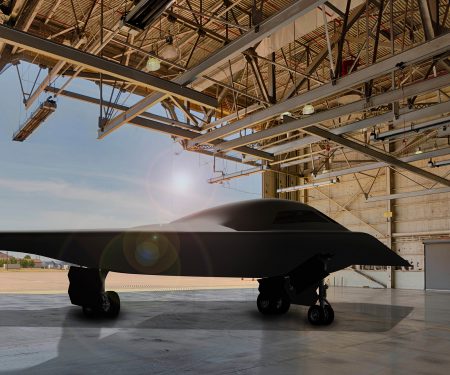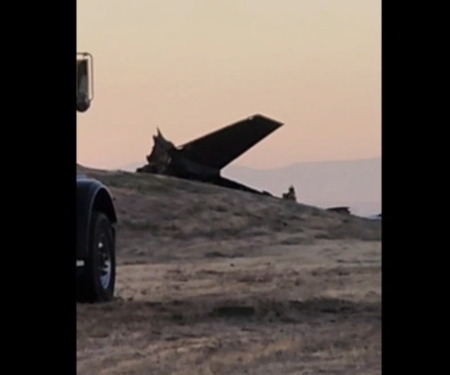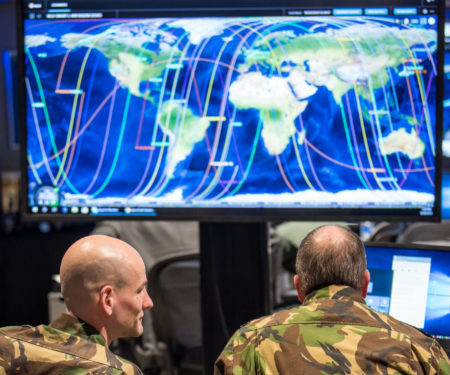Radar Sweep
US: Iranian Troops in Crimea Backing Russian Drone Strikes
The White House said Iranian troops are “directly engaged on the ground” in Crimea supporting Russian drone attacks on Ukraine’s power stations and other key infrastructure, troubling evidence of Tehran’s deepening role assisting Russia as it exacts suffering on Ukrainian civilians just as the cold weather sets in. National Security Council spokesman John Kirby told reporters that Iran has sent a “relatively small number” of personnel to Crimea, a part of Ukraine unilaterally annexed by Russia in contravention of international law in 2014, to assist Russian troops in launching Iranian-made drones against Ukraine.
Space Force May Seek Commercial Fleet to Augment Wartime Needs
The Space Force may seek to deepen partnerships with private companies by establishing a fleet of commercial spacecraft that could be on standby for military use, much like the Civil Reserve Air Fleet. Through the CRAF, the Department of Defense contracts with commercial airlines to provide additional airlift capacity in emergencies. The Commercial Augmentation Space Reserve could function in a similar manner, said Col. Joseph Roth, director of Space Systems Command’s Innovation and Prototyping Directorate.
Troops Needing Abortions Will Get Travel Allowances and Leave, Pentagon Says
The Defense Department said it will cover travel and transportation expenses for service members and dependents who need to travel to obtain an abortion following a Supreme Court ruling in June striking down constitutional protections for the procedure. Service members will also be able to request an "administrative absence" from their duty stations if they need time off for an abortion, meaning that time won't be taken out of their normal leave, according to the department and a memo by Defense Secretary Lloyd J. Austin III announcing the changes.
The Army Is Testing a Data Platform Just for Intel Officers
The Army is testing a data analytics platform that will make intel officers smarter. And if all goes well, it could be available to intel officers across the service. “We are testing an Army Intelligence Data Platform. So essentially a system that will ingest all of the Army's intel data—data from the intel community, commercial data, whatever data sources our intel professionals may need or want,” said Mark Kitz, the program executive officer for Intelligence, Electronic Warfare, and Sensors.
First Production AW609 Tiltrotor Finally Flies After Decades of Development
The maiden flight of the first production Leonardo AW609 is another step toward the operational fielding of another tiltrotor aircraft, which would join the so far unique Bell Boeing V-22 Osprey as well as become the first commercial aircraft in its class. After years of development and delays punctuated by a fatal crash, the AW609 looks increasingly ready to enter service, with the Italy-headquartered company hoping it will eventually undertake military missions as well as fly for civilian customers.
PODCAST: ‘Building Aerospace Power: Implications for Tomorrow’s Industrial Base’
In Episode 98 of the Aerospace Advantage podcast, John Baum chats with Kevin Michaels, Richard Aboulafia, and Michael Cisek of the Aerodynamic Advisory Group, a top analyst firm in this sector. America is an aerospace nation that spans innovation, production, sustainment, and consumer markets. Both commercial applications and national security interests rely on the domains of air and space. This episode will assess the health of this sector and steps that can be taken to ensure the long-term viability of this capability and capacity. From a military vantage, it is essential that the nation procure types such as the F-35, B-21, Next Generation Air Dominance fighter, KC-46, T-7, next-gen collaborative combat aircraft, and a broad array of space capabilities. That demands the ability to innovate and produce. We can’t take that for granted.
US Busts Network Providing Technology to Russian Military
The Biden administration announced a round of criminal charges and sanctions related to a complicated scheme to procure military technologies from U.S. manufacturers and illegally supply them to Russia for its war in Ukraine. Some of the equipment was recovered on battlefields in Ukraine, the Justice Department said, and other nuclear proliferation technology was intercepted in Latvia before it could be shipped to Russia.
COMMENTARY: Russia’s Military Aircraft Exports Are Headed for a Nosedive
“Before the invasion of Ukraine, Russia’s aerospace leadership had planned to market the next generation heavy fighter bomber, the Su-57, and its highly touted derivative the Su-75 to several foreign military buyers. These plans now appear to be in ruins. The Su-57 suffers from a low production rate. Export models are unlikely to be available until the end of the decade. As for the medium-weight Su-75, the so-called “Checkmate” aircraft, it has been only realized in models and computer graphics,” write Peter A. Wilsona, an adjunct international defense researcher, and John V. Parachini, a senior international defense researcher, both with the Rand Corporation.
Open for Business: Space Force’s ‘Front Door’ Now Fully Operational
The Space Force’s one-stop shop for industry engagement—the Space Systems Command Front Door—is now fully staffed and ready to help companies new to Pentagon contracting figure out who to talk to within the sprawling space acquisition bureaucracy, according to SSC’s Col. Joseph Roth. “We have a team that can answer the email, and we have operators standing by, which has been a problem in the past,” he told the Space Industry Days conference in Los Angeles.
CYBERCOM Conducts Wide-Ranging Global Defensive Operation
U.S. Cyber Command recently conducted a wide-ranging defensive cyber operation across several organizations with the goal of improving its interoperability with partners and bolstering network defense. The global operation looked for potential malware on internal networks and was intended to improve processes and identify current defensive best practices to further integrate across various Department of Defense networks, a spokesperson said.
China Looked at Putting a Monitoring Satellite in Retrograde Geostationary Orbit via the Moon
China appears to have considered boosting its space situational awareness capabilities by placing a satellite in a retrograde orbit in the geostationary belt. A paper published in Nature Scientific Reports by authors from the Xi’an Satellite Control Center looks at using a lunar swingby to insert a satellite into such an orbit for monitoring activities and debris warning.
Why Are All These Pioneering Aviators Buried in Burbank?
All pilots must make that mysterious final flight and leave their mortal remains behind. Some choose to have their ashes scattered over a favorite airfield, while military pilots might land at Arlington National Cemetery in Virginia. So, how did 14 aviation pioneers come to rest beneath a Spanish-style arch in Burbank, Calif.?



